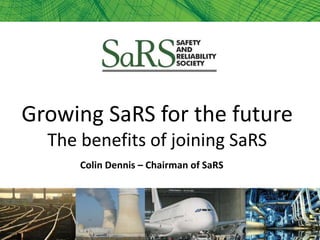Join SaRS (Short presentation)
- 1. Growing SaRS for the future The benefits of joining SaRS Colin Dennis – Chairman of SaRS
- 2. What is SaRS? • The Safety and Reliability Society (SaRS) was formed in 1980 • SaRS is a Professional Affiliate of the Engineering Council • SaRS has links with many organisations including European Safety and Reliability Association (ESRA) and British Standards Institute (BSI) • SaRS is run by volunteers who know and understand Safety and Reliability – It’s run by the members for the members • It promotes Safety and Reliability learning, development and recognition across all industries in the UK and Internationally • Honorary Fellows include individuals such as Lord Cullen and Mike Weightman Safety and Reliability Society 2017
- 3. Why be a member? • Being part of an established professional body with recognised titles after your name: MSaRS for Members and, for the more experienced Fellows, FSaRS • Broadening your horizons through cross-industry learning and knowledge transfer • Access to free and discounted safety and reliability related events • Keeping informed on safety and reliability developments through the regular SaRS specific newsletters and the peer reviewed quarterly Journal • Raising your profile through opportunities to speak at events or on webinars and/or getting papers published in the journal Safety and Reliability Society 2017Good for you - Good for your organisation - Good for the profession
- 4. Why be a member? - and there’s more • Networking opportunities to establish valuable contacts and friends that are key for enhanced learning and career development • Introduction to new techniques and technologies • Access to advice and peer review from cross-industry experts • Access to a comprehensive website, including a specific members area, which has been developed with the needs of the membership in mind – www.sars.org.uk • SaRS provides a route to Incorporated Engineer and Chartered Engineer registration with the Engineering Council • Career path planning through ‘mycareerpath’ on the website Safety and Reliability Society 2017Good for you - Good for your organisation - Good for the profession
- 5. Membership • Anyone can join SaRS as an Associate or a Student • It’s not just for engineers – mathematicians, physicists, chemists, psychologists, sociologists, etc. working in the field can (and do) join and benefit as members • Becoming a Corporate Member (MSaRS) is a straightforward process – you need a good degree in a relevant subject and a minimum of two years experience in relevant S&R work – Look at the guidance on the SaRS website and see - www.sars.org.uk Safety and Reliability Society 2017
- 6. Summary • SaRS is run for the benefit of its members and for the wider development of safety, reliability and risk management practice • Being a member of SaRS is recognition of your expertise • SaRS provides a route to Professional Registration for S&R specialists • SaRS relies on growing its membership to ensure its continued success • It’s never too early (or too late) to join – it’s easy • Join and get involved Safety and Reliability Society 2017 Good for the profession Good for you - Good for your organisation -
- 7. Contact Details If you are interested in any aspect of SaRS please contact us - we will be happy to help: Colin Dennis – chair@sars.org.uk In the office: Jacqui Christodoulou - info@sars.org.uk www.sars.org.uk Thank you for your interest in the Safety and Reliability Society Safety and Reliability Society 2017
Editor's Notes
- #4: The Society has strong international links and contributes to the organisation of ESREL and AR2TS conferences






